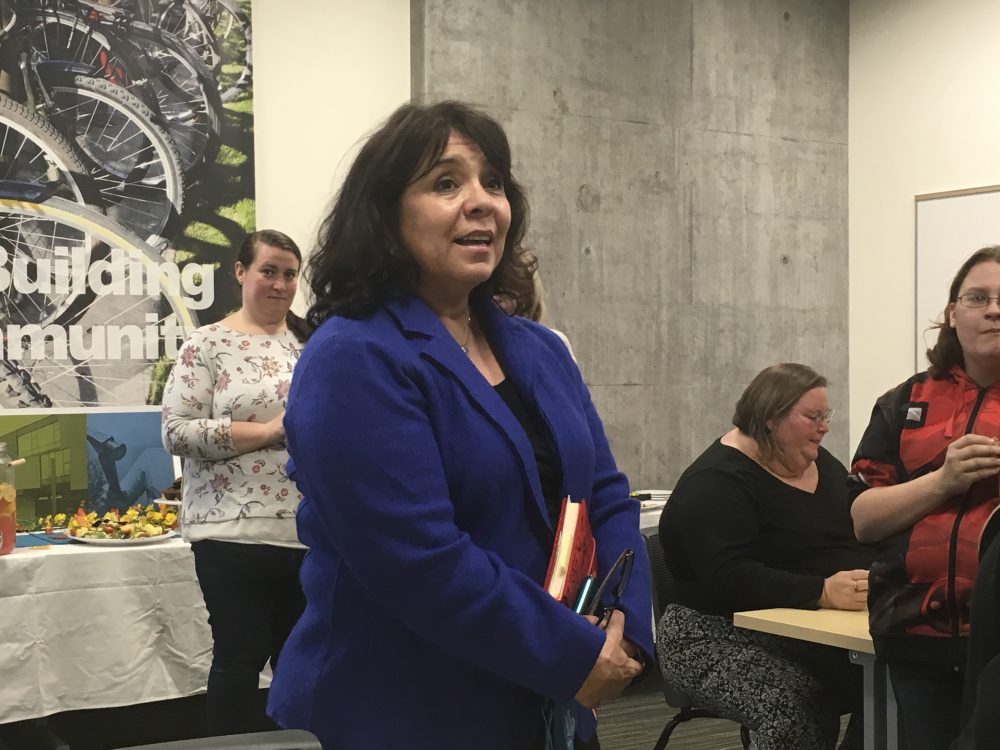This content was published: January 9, 2020. Phone numbers, email addresses, and other information may have changed.
Q & A: Cascade’s new dean of Student Development Vivian Miranda advocates making campus connections
Photos and Story by Abe Proctor
Vivian Miranda joined Portland Community College last term as the dean of Student Development at the Cascade Campus after serving in similar capacities at Maricopa Community College in Arizona.
Her new job at PCC represents a homecoming of sorts as she previously worked for Clackamas Community College. Miranda has a doctorate in Higher and Postsecondary Education Leadership and Innovation, a master’s degree in Adult Education/Student Development, a bachelor’s in Social Work, and an associate of Arts degree.
Can you elaborate on your philosophy and talk about what attracted you to PCC?
Vivian Miranda: My philosophy when supporting and directing comprehensive student support programs and services is a holistic and inclusive approach, supported by a student-first principle and ethic of care philosophy while ensuring relevant and purpose-driven programming and assessment. One of my strengths is my ability to think conceptually and help teams develop innovative solutions to support student success and the overall college experience. I strongly believe we all serve as facilitators of learning and as change agents for our students.
I am an Arizona native who will no doubt miss the sunshine, but I am happy with my decision to relocate to Portland. Cascade’s commitment to student advocacy, community partnerships, social justice, equity, and student leadership is impressive. The work being done here supports personal and academic development and a meaningful college experience. I am happy to have an opportunity to continue to support Guided Pathways, integrated support, and purposeful and intentional programming designed to support closing academic achievement gaps.
What is the role of Student Services?
Miranda: Student Services is the front door to our college; a door that can lead to academic success and personal development. When students visit front door services – such as enrollment services, financial aid, testing, advising, and new student orientation – we are provided with an opportunity to welcome students to our college, an opportunity to teach students how to navigate through the enrollment process, but most importantly, an opportunity to say, “Your dreams and hopes matter to us.” This type of validation is extremely important particularly for traditionally underserved populations.
All of us, regardless of position, have significant contributions we can share with our students. It is important for us to make meaningful connections with our students at every possible touch point. Students who persist with academic goals share one common variable – a strong connection to someone at the college. When connections are made – academically and/or interpersonally – students begin to believe they can be successful, regardless of obstacles or challenges.
What are some of the existing services here that work well and what new initiatives would you start?
Miranda: I haven’t had the opportunity to fully evaluate Cascade’s student support services; however, I am sure that existing programs have a positive impact on the student experience, particularly enhanced student engagement and a sense of belonging – two factors proven to contribute to increase student retention and persistence.
Areas of opportunity include establishing measurable program and student learning outcomes supported by assessment; increased campus-wide integrated support; increased cross-programming collaboration; developmental education redesign and scaled innovative retention strategies. By this I mean campus-wide acknowledgement and celebration of first-generation students; awareness campaigns to help students better understand how to successfully navigate through the college experience; employee and peer mentor programs; and professional development designed to connect student development theory to the work of the practitioner across the student life cycle.
What advice would you give to a new student?
Miranda: I am a first-generation community college graduate who walked onto campus with absolutely zero college capital, and very little life experience. My community college experience began with a dream of becoming a social worker, a desire to live a meaningful life and a desire to move out of poverty. I attribute much of my success to the faculty and staff who validated my presence, my dreams, and my desire to change the trajectory of my life. I am proud of my younger self for having the courage to say, “I want to be a college graduate.”
My advice to a new student would be to imagine living a life full of meaning and passion. Make a commitment to yourself – a commitment that allows for self-discovery and learning. Once on campus, be willing to share your hopes and dreams with faculty, staff and classmates; doing so will help to establish meaningful relationships and campus-wide support. Believe in the power of hard work, commitment and dedication. Be willing to try new things, to ask questions and most importantly to ask for help. Visualize success; visualize being a college graduate.

